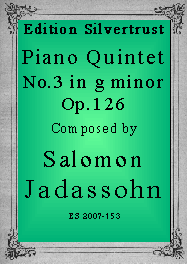Presents
Salomon Jadassohn
Piano Quintet No.3 in g minor, Op.126
 Salomon
Jadassohn (1831-1902) was one of the most famous and respected teachers of
composition during the last half of the 19th century. He was born in Breslau, the capital
of the Prussian province of Silesia. First educated locally, Jadassohn enrolled at the
Leipzig Conservatory in 1848, just a few years after it had been founded by
Mendelssohn. There he studied composition with Moritz Hauptmann, Ernst Richter
and Julius Rietz as well as piano with Ignaz Moscheles. At the same time, he
studied privately with Franz Liszt in Weimar.
Salomon
Jadassohn (1831-1902) was one of the most famous and respected teachers of
composition during the last half of the 19th century. He was born in Breslau, the capital
of the Prussian province of Silesia. First educated locally, Jadassohn enrolled at the
Leipzig Conservatory in 1848, just a few years after it had been founded by
Mendelssohn. There he studied composition with Moritz Hauptmann, Ernst Richter
and Julius Rietz as well as piano with Ignaz Moscheles. At the same time, he
studied privately with Franz Liszt in Weimar.
Being Jewish, Jadassohn was unable to qualify for the many church jobs which were usually available to graduates of a conservatory such as Leipzig. Instead he worked for a Leipzig synagogue and a few local choral societies as well as teaching privately. Eventually, he was able to qualify for a position at the Leipzig Conservatory, teaching piano and composition. Among his many students were Grieg, Busoni, Delius, Karg-Elert, Reznicek and Weingartner.
Jadassohn wrote over 140 works in virtually every genre, including symphonies, concertos, lieder, opera and chamber music, the latter being among his finest compositions. Considered a master of counterpoint and harmony, he was also a gifted melodist, following in the tradition of Mendelssohn. But one also hears the influence of Wagner and Liszt, whose music deeply impressed him.
Jadassohn scholar Klaus-Peter Koch believes that Jadassohn and his music were not better known primarily for two reasons: The first being Carl Reinecke and the second being the rising tide of anti-semitism in late 19th century Wilhemine Germany. Reinecke was almost Jadassohn's exact contemporary and somewhat of a super-star. Not only was he a world famous piano virtuoso but also an important professor at the Leipzig Conservatory and later its director. If this were not enough, he served as the conductor of the renowned Leipzig Gewandhaus Orchestra. Under these circumstances, it was hard for a colleague to get the public's attention. Koch notes, that toward the end of the 19th century, anti-semitic critics attacked Jadassohn's music, labeling it academic and dry, an epithet which has stuck with it ever since without anyone ever investigating. However, even a brief hearing of any of his chamber music reveals how ludicrous this assessment is. Listen to our sound-bites. Salomon Jadassohn was a first-rate composer, who unfortunately was never really given a chance to promote his music.
Jadassohn's Third Piano Quintet was first published in 1895. The opening movement, Allegro energico, begins with great force with double-stops in all of the voices followed by rushing 16th note passages all of which create a sense of urgency. Jadassohn's development is masterful. The lovely second theme then appears almost without notice. The second movement, Andante tranquillo, has for its main theme a gorgeous and highly romantic melody introduced first by the strings alone. The mood remains calm for many measures before at last romance turns briefly to passion. A scherzo, Allegretto non troppo vivo, follows. It is actually a gypsy rondo with rich and full tonal effects. The finely contrasting middle section is a lovely cantabile song. The finale, Allegro appassionato, begins in a somewhat similar mood as the first movement but the themes flow more effortlessly. Power. lyricicism and playfulness alternate. Jadassohn even includes a brief quote from the wedding march of Mendelssohn's Midsummer's Night Dream, but in the minor!
In our opinion, this quintet is the equal of any other from this period, including the Brahms and Dvorak. It would be a tremendous success if presented in concert. Jadassohn meant for this music to be played and it plays with no particular technical difficulties which ought to put it high on the list of recommended works for amateurs as well. Out of print for a over century, we are pleased to make it available once again.
Parts: $39.95